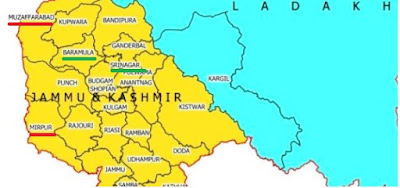Accession Day (Jammu and Kashmir)
26 October
My Dear Indians,
Today is Accession Day of Jammu and Kashmir.
Jammu and Kashmir was earlier a part of the Sikh empire of Raja Ranjit Singh who was based in Lahore.
Gulab Singh was the Governor of J&K under Raja Ranjit Singh.
Towards the end of the Sikh empire, Gulab Singh founded the Dogra Dynasty and became the first King of Jammu & Kashmir. This was in the 1820s.
“Dogra” is a clan in Jammu region. Language that they speak is Dogri.
Maharaja Gulab Singh’s descendants ruled Jammu & Kashmir.
Maharaja Hari Singh of the Dogra dynasty was the ruler of Jammu & Kashmir when India attained independence.
15 August 1947- India attained independence
Jammu & Kashmir was one of the princely states that, like all other princely states, had to choose between joining the Union of India or Pakistan.
But Maharaja Hari Singh decided to stay independent.
Maharaja Hari Singh decided to stay independent but Pakistan wanted to occupy Jammu and Kashmir.
North West Frontier Province of Pakistan (now known as Khyber Pakhtunkhwa) is adjacent to the state of Jammu &Kashmir.
Pakistan tried to push in tribal militia or कबायली into J&K from its North West Frontier Province.
(कबायली is derived from the word कबीला which means a group of tribal people)
In the above map, the names underlines in red (Mazaffarabad and Mirpur) were the borders of Maharaja Hari Singh's J&K
This border of J&K along Pakistan’s North West Frontier Province was guarded by soldiers of Kashmir State Forces of Maharaja Hari Singh.
22 October 1947-
Tribal militia कबायली and regular Pakistan army soldiers (disguised as tribals) crossed the International border between Pakistan and Jammu & Kashmir.
They entered J&K through the town of Muzzafarabad . The Maharaja's forces were 50 per cent Muslim and 50 per cent Dogra. The Muslim elements had revolted and joined the Pakistani forces.
Their aim was to capture Srinagar - The Capital.
But they stopped at Baramulla to loot and plunder the local people.
You can see the positions of Baramula and Srinagar on this map.
At this time, the Indian Army was nowhere in J&K and had no intentions of coming to J&K because Maharaja Hari Singh had not agreed to merge his state with Union of India.
Let us here remember Mohd Maqbool Sherwani
Mohd Maqbool Sherwani was a 19 years young boy in Baramula town.
This boy single handedly stopped the raiders (Tribal militia कबायली and regular Pakistan army soldiers) at Baramulla which eventually helped the Indian Army save J&K.
When the raiders were in Baramulla, Maqbool Sherwani went around telling them not to advance towards Srinagar as the Indian Army had reached the outskirts of Baramulla.
The raiders did not dare to move beyond Baramulla fearing that they would be demolished by the Indian Army.
After wasting four days of time in Baramulla, when the raiders realized that they had been fooled by a 19 years young boy ,they brutally killed Mohd Maqbool Sherwani and crucified him.
Unable to stop the advance of Pakistani raiders, Maharaja Hari Singh requested India for help. India declined to enter a foreign territory. (Remember J&K was not a part of India then).
India agreed to send in its army to Jammu & Kashmir only if Maharaja Hari Singh signed the instrument of accession and merged his state with the Union of India.
Maharaja Hari Singh had realized that it was impossible for him to stay independent. He agreed to merge J&K with the Union of India.
V P Menon (an Indian Civil Servant and Secretary to the Govt of India) and Colonel Sam Manekshaw went to Srinagar from Delhi to get the Maharaja’s signature on the Instrument of Accession
Sardar Patel, the Deputy Prime Minister and Home Minister of India insisted that V P Menon be accompanied by Col. Sam Manekshaw.
26 October 1947 –
Maharaja Hari Singh signed the instrument of accession. Jammu & Kashmir became a part of India.
V P Menon and Colonel Sam Manekshaw returned to Delhi with the signed “Instrument of Accession”.
Here they had a meeting with Prime Minister Nehru, Deputy Prime Minister Sardar Patel, Defense Minister Baldev Singh and some more ministers.
Now, I am quoting below from an interview of Field Marshal Sam Manekshaw who was a Colonel then and later led India to the glorious victory in the war of 1971 against Pakistan as the Chief of Indian Army.
“As usual Nehru talked about the United Nations, Russia, Africa, God, Almighty, everybody, until Sardar Patel lost his temper. He said, 'Jawaharlal, do you want Kashmir, or do you want to give it away'. He (Nehru) said,' Of course, I want Kashmir. Then he (Patel) said 'Please give your orders'. And before he ((Nehru) could say anything Sardar Patel turned to me and said, 'You have got your orders'”.
Colonel Sam Manekshaw walked out of the room.
This was the beginning of military operations by the Indian Army in Jammu and Kashmir – the new state of The Union of India.
Jai Hind !
Gaurav Negi



Comments
Post a Comment